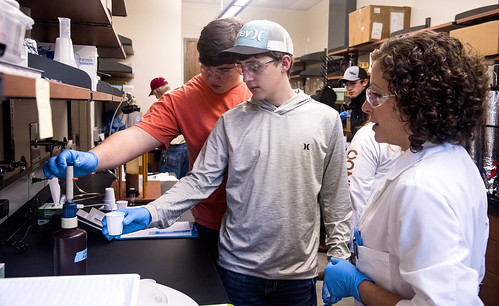Arkansas high school students dig in to environmental, agricultural research
By Fred Miller
U of A System Division of Agriculture
Fast Facts:
- Arkansas high school students visited the Arkansas Agricultural Experiment Station
- Students and teachers get hands on agricultural and environmental research
- Students hear about diversity of ag career options
(722 words)
Download related PHOTOS from Flickr album: https://flic.kr/s/aHsmocEtkq
Watch related VIDEO: https://youtu.be/eFFys4mRlRI
FAYETTEVILLE, Ark. — More than 150 Arkansas high school students and teachers tested water quality, threshed wheat seed and climbed into holes at the University of Arkansas System Division of Agriculture’s Arkansas Agricultural Research and Extension Center Sept. 25.

And that was just the easy stuff.
The U of A department of crop, soil and environmental sciences hosted the 10th annual Environmental and Agricultural Sustainability Field Trip Tuesday at the Division of Agriculture’s Arkansas Agricultural Research and Extension Center.
Holly Yeatman, recruiting coordinator for the CSES department, said the event connects students with environmental and agricultural experts for hands-on experiences related to what they’re learning in the classroom.
“So many of the things that we talk about and show students are directly related to their curriculum,” Yeatman said.
Natalie Olivieri, Rogers High School science teacher, said this was the seventh year she brought her advanced placement environmental science students to the field trip.
“Usually at this point, we finish up our soil unit, so this is really great hands-on, real-world application experience for them,” Olivieri said.
The field day helps the students see how what they learn in class applies in the real world, Olivieri said, “and how it’s used to feed so many people, and how many careers are out there, many I think they have never heard of before.”
The field trip presentations and activities also serve as a bridge between the soils unit of their studies and the next unit where they study land use, especially in agriculture, Olivieri said.
“My favorite thing about this program is seeing the lightbulbs come on for the students whenever they start seeing the things or hearing those things I told them about, and they hear them again, and seeing them make those connections.”
Students arrived at the research and extension center first thing Tuesday morning. Following a brief welcome address from Deacue Fields, dean of the Dale Bumpers College of Agricultural, Food and Life Sciences, students split into small groups and loaded into rustic hay wagons toted by tractors. Each group visited stations led by faculty, personnel and alumni of the CSES department and visiting specialists from the Beaver Water District and Arkansas Cooperative Extension Service.
Each session lasted about 15 minutes and introduced students to sustainability concepts that are shaping the future of agricultural practices and environmental management.
Two tours, each with six stations, covered a wide range of topics, including remote drone sensing for soybean research, water quality and resource management, wheat breeding, soybean and rice research, erosion control, soil sustainability and careers in agriculture.
Colin Stare, a Rogers High School senior, said his favorite stops were the rice research plots and the soil profile pit.
Stare said the rice research plots let him see the genetic diversity available in rice genetic stock and learn about different traits that scientists try to breed into commercial varieties. “It was really cool seeing the difference,” he said.
Rogers classmate Brock Badely was also interested in the rice plots, and was especially fascinated by the engineering that created a rice paddy in the Ozarks.
Stare said the soil profile pit was also interesting, especially since his class has just been studying soils.
“We just took a test on it, so we thought we knew a little on it,” Stare said. “And they ended up saying there were something like 21,000 different organisms in it. We thought we knew something, but we really only knew a small scale, so it really opened our eyes to the greater magnitude of things.”
Badely agreed with Stare’s assessment of the impact of the field day on their recent studies.
“It was very visual,” Badely said. “We learned about the different kinds of soil in class, and then today we were out to see it in person and they had this big hole dug up where we could actually see each different (soil) horizon.”
“Being able to visually see it in person was a lot more informational than just looking at it on a screen,” Badely said.
Badely also enjoyed seeing how Division of Agriculture scientists use drones for plant research. “It uses technology,” he said, “and uses a new form by doing it from above the ground.”
To learn more about the impact of agricultural sciences in Arkansas, contact your local Cooperative Extension Service agent or visit http://www.uaex.uada.edu/.
About the Division of Agriculture
The University of Arkansas System Division of Agriculture’s mission is to strengthen agriculture, communities, and families by connecting trusted research to the adoption of best practices. Through the Agricultural Experiment Station and the Cooperative Extension Service, the Division of Agriculture conducts research and extension work within the nation’s historic land grant education system.
The Division of Agriculture is one of 20 entities within the University of Arkansas System. It has offices in all 75 counties in Arkansas and faculty on five system campuses.
Pursuant to 7 CFR § 15.3, the University of Arkansas System Division of Agriculture offers all its Extension and Research programs and services (including employment) without regard to race, color, sex, national origin, religion, age, disability, marital or veteran status, genetic information, sexual preference, pregnancy or any other legally protected status, and is an equal opportunity institution.
Media Contact: Fred Miller
U of A Division of Agriculture
Arkansas Agricultural Experiment Station
(479) 575-5647
fmiller@uark.edu
Related Links